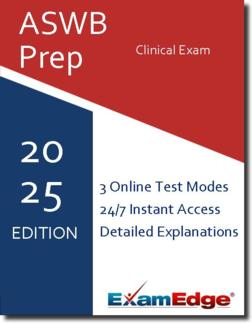ASWB Clinical Exam (CE) Practice Tests & Test Prep by Exam Edge - Additional Information
Based on 22 Reviews
- Real Exam Simulation: Timed questions and matching content build comfort for your ASWB Clinical Exam test day.
- Instant, 24/7 Access: Web-based ASWB Clinical Exam practice exams with no software needed.
- Clear Explanations: Step-by-step answers and explanations for your ASWB exam to strengthen understanding.
- Boosted Confidence: Reduces anxiety and improves test-taking skills to ace your ASWB Clinical Exam (CE).

ASWB Clinical Exam - Additional Information
At ExamEdge.com, we focus on making our clients' career dreams come true by offering world-class practice tests designed to cover the same topics and content areas tested on the actual Association Social Work Boards ASWB Clinical Exam (CE) Certification Exam. Our comprehensive ASWB Clinical Exam practice tests are designed to mimic the actual exam. You will gain an understanding of the types of questions and information you will encounter when you take your Association Social Work Boards ASWB Clinical Exam Certification Exam. Our ASWB Clinical Exam Practice Tests allow you to review your answers and identify areas of improvement so you will be fully prepared for the upcoming exam and walk out of the test feeling confident in your results.
Because our practice tests are web-based, there is no software to install and no need to wait for a shipment to arrive to start studying. Your ASWB Clinical Exam practice tests are available to you anytime from anywhere on any device, allowing you to study when it works best for you. There are 5 practice tests available, each with 100 questions and detailed explanations to help you study. Every exam is designed to cover all of the aspects of the ASWB Clinical Exam exam, ensuring you have the knowledge you need to be successful!


